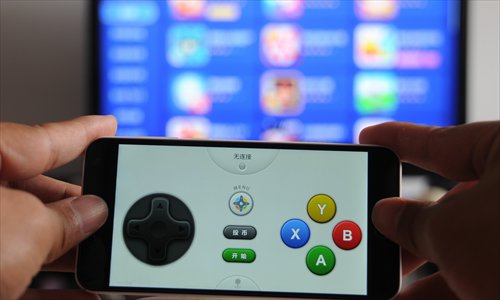New regulations will help protect phone games IP, but may slow industry

Photo: IC
The business of firms that help game studios obtain publication numbers for their smartphone games is expected to soar as the top media watchdog's new regulations came into effect on Friday, demanding game operators gain legal status before going online.
Experts said the regulations may help protect intellectual property rights in an industry that has seen plenty of copycats, but warned that they might also hurt the ability of independent games to be creative.
The State Administration of Press, Publication, Radio, Film and Television (SAPPRFT) posted a notice on its website on June 2 that announced that mobile phone games would start to be included in the administration's Internet publication management regime.
The main outcome of this is that now studios have to apply for a publication number for their smartphone games before putting them online, in the same way they do for other online games.
A publication number is the registered number of approval given by SAPPRFT to games that it deems are acceptable to be consumed by the general public after review.
Mobile games released before July 1 have until October 1 to get their number, otherwise they will be deleted from the Chinese Internet.
These new rules have spurred a boom for companies who apply for these publication numbers on the behalf of publishers.
According to the National Business Daily, less than 5 percent of the over 10,000 phone games released in 2015 have applied for and gained publication numbers, mostly because whether or not they had this official approval was rarely checked.
Now these companies have seen their business become many times busier than ever before, the Shanghai-based IT Times reported.
"We will help you fix the game until it can pass the examination, so that we can get you the publication number, no matter where you are in China," Xiao Na, an employee at a Beijing-based company that specializes in getting publication numbers for games, told the Global Times.
According to Xiao Na, his firm charges around 18,000 yuan ($2,700) to take care of the publication number application process, adding that they have cut their price recently due to an increase in competition.
Another Beijing-based company asked for 20,000 yuan for the same service, and said the application procedure before July 1 was simpler.
Small companies, especially those with only three or five employees, will find it difficult to afford these applications, Chen Xiaohuan, a game industry analyst from the iResearch, told the Global Times.
On the other hand, big companies will be barely affected by these regulations.
"We have legal licenses, so we don't need to use application companies," an employee of a company that operates one of the biggest online chess games in China told the Global Times.
"The industry will experience a reshuffle in the near future, as big companies grow bigger by absorbing some independent games firms and some small ones are eliminated," Chen said.
Intellectual property rights
The SAPPRFT notice divided games into two different categories. Games which do not involve content such as political and military topics and that have no plot, such as digital board games and block elimination games, can have their applications dealt with more quickly - within 20 working days - than potentially controversial games.
Updated versions of games and their downloadable content are considered new games by the regulation and must go through the examination and approval procedure again.
"The game market in China was 143.5 billion in 2015, of which mobile games accounted for half," Chen said. "With a 101 percent increase in the number of phone games released in 2015, it is now the time to further regulate the market, in which good and bad games are mixed together."
According to Chen, due to the lack of supervision, many original phone games have been copied by others who only make basic superficial changes, and illegal advertisements related to sexual content are common on these "bad" games. "The biggest benefit of the new regulation will be to better protect the intellectual property rights of those original works," Chen noted.
"However, as the industry changes rapidly, the lifespan of a phone game can be as short as three months, while applying for a publication number can take as long as long as six months, which will cause many failures and kill creativity," Chen said.
According to iResearch statistics, far fewer new mobile phone games were released on the Apple App Store in the days after the new regulation came into effect compared to the days before.
Industry insiders have to wait and see as the new rules' details are not in place.
"Nobody in the industry will know how to behave until the regulation has actually come into effect and problems appear," said an employee from ELEX, a Beijing-based phone game company.
Newspaper headline: Rules of the game